|
|
|
Sort Order |
|
|
|
Items / Page
|
|
|
|
|
|
|
| Srl | Item |
| 1 |
ID:
085376
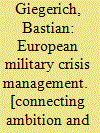

|
|
|
|
|
| Publication |
London, International Institute for Strategic Studies, 2008.
|
| Description |
95p.
|
| Series |
Adelphi paper; 397
|
| Standard Number |
9780415494199
|
|
|
|
|
|
|
|
|
|
|
|
Copies: C:1/I:0,R:0,Q:0
Circulation
| Accession# | Call# | Current Location | Status | Policy | Location |
| 054076 | 355.6094/GIE 054076 | Main | On Shelf | General | |
|
|
|
|
| 2 |
ID:
173123
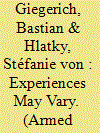

|
|
|
|
|
| Summary/Abstract |
This article examines the coherence of the North Atlantic Treaty Organization’s (NATO) coordinated military strategy during the war in Afghanistan. We argue that much of this coherence can be lost when decision makers adopt multinational strategic guidance that is then interpreted by different national contingents operationally. Different strategic and military cultures across troop-contributing countries may account for observed variation in operational outcomes, but better theoretical tools are needed to examine this phenomenon. Our aim is to further scholars’ understanding of how cultural variables can affect mission outcomes. This assumed effect of strategic and military cultures is explored empirically with reference to the Canadian and German Provincial Reconstruction Teams in Afghanistan, which formed part of the NATO-led ISAF operation.
|
|
|
|
|
|
|
|
|
|
|
|
|
|
|
|
| 3 |
ID:
098786
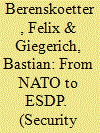

|
|
|
|
|
| Publication |
2010.
|
| Summary/Abstract |
This article addresses the question why Germany invested in what became the European Union's Security and Defense Policy (ESDP), a potential competitor to NATO. In addition to highlighting Germany's role in the development of ESDP, the paper offers a social constructivist explanation for this investment based on the concepts of friendship, estrangement, and emancipation. It develops the argument that (1) states gain ontological security by investing in international institutions to negotiate and pursue ideas of order with friends; (2) deep and enduring dissonance between friends signifies a process of estrangement and poses a threat to ontological security; and (3) if states cannot restore resonance with the old friend-institution configuration, they choose a strategy of emancipation by investing in an alternative. Applied to an analysis of German strategic adjustments between 1990 and 2009 in the context of U.S.-led interventions in Iraq, the Balkans, and Afghanistan, the article suggests that Germany invested in ESDP to offset enduring dissonance with the United States and NATO about appropriate mandate, missions, and means, with France and ESDP emerging as a suitable alternative. With this, the article offers valuable insights into the parameters guiding German security policy and the structure of transatlantic relations and also provides a theoretical alternative to the realist balancing proposition.
|
|
|
|
|
|
|
|
|
|
|
|
|
|
|
|
| 4 |
ID:
144110
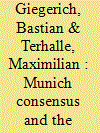

|
|
|
|
|
| Summary/Abstract |
In December 2015, Time chose German Chancellor Angela Merkel as its person of the year, calling her ‘Chancellor of the Free World’. A month earlier, The Economist had named her ‘the indispensable European’. The tendency to project outsized expectations onto the individual reflects a wider phenomenon: German economic and political power in Europe has grown, partly because Germany weathered the 2008 economic crisis relatively well, and partly because of the lethargy of other European powers, including France and the United Kingdom.
|
|
|
|
|
|
|
|
|
|
|
|
|
|
|
|
| 5 |
ID:
113159
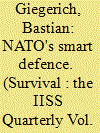

|
|
|
|
|
| Publication |
2012.
|
| Summary/Abstract |
At the 2012 NATO Summit in Chicago, Secretary-General Anders Fogh Rasmussen's 'smart defence' initiative will be a core agenda item. Rasmussen has argued that Allies need to cooperate more, and more flexibly, to prevent a deterioration in NATO's collective capability in the face of the three-pronged challenge of budget austerity, ongoing operational challenges, and a security environment characterised by deep strategic uncertainty. As he put it at the 2012 Munich Security Conference, the political initiative would amount to 'a new way for NATO and Allies to do business … this is about doing more by doing it together'. In Chicago, the Alliance was expected to agree on a political declaration providing the conceptual basis for smart defence, and to present some two-dozen multinational projects to mark the start of the initiative.
|
|
|
|
|
|
|
|
|
|
|
|
|
|
|
|
| 6 |
ID:
052434
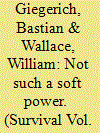

|
|
|
|
|
| Publication |
2004.
|
| Description |
p163-182
|
| Summary/Abstract |
Despite the failure of EU member states to meet their 2003 targets for the Headline Goal, which would make their formal commitment to a European Security and Defence Policy operational, there was significant progress in other areas of European defence cooperation that year. Among them were the 'Berlin-Plus' arrangements for cooperation between NATO and EU military operations; the transfer to the EU of responsibility for peacekeeping in Macedonia (Operation Concordia) and for policing in Bosnia; and the successful launch of the EU's first long-range operation, Operation Artemis, in the Eastern Congo. In fact, there has been a remarkable increase in the scale, distance and diversity of external operations by European forces - an increase that has scarcely registered in public debate across Europe, let alone the United States. At the same time that EU governments were slipping behind the Headline Goals target, they were sustaining 50,000-60,000 troops on operations outside their common boundaries, in more than 20 countries in southeast Europe, Afghanistan and Central Asia, Iraq and the Gulf, and Africa.
|
|
|
|
|
|
|
|
|
|
|
|
|
|
|
|
| 7 |
ID:
074962
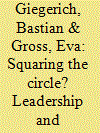

|
|
|
| 8 |
ID:
110299
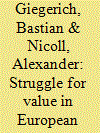

|
|
|
|
|
| Publication |
2012.
|
| Summary/Abstract |
After decades of trying, Europe still does not get the best value out of the substantial amounts it spends on defence. The experience of the past 20 years suggests that European countries will continue to need to deploy forces in a wide range of operations for a wide range of tasks. Yet defence spending is in a decline that is unlikely to be reversed unless there is a major strategic shock. These two facts suggest that Europe's armed forces will be increasingly squeezed and forced to look for new solutions. They have been under pressure for some time to deliver more effective capabilities with smaller resources, but cuts in spending necessitated by budgetary austerity suggest that these pressures could become acute. European countries can still have strong, and more effective, militaries, but to do so they must make better use of their financial resources.
It is not a matter of falling in with the desperate demand of former US Secretary of Defense Robert Gates, who in 2011 joined the long line of US officials calling for a stronger effort from Europe. It is up to European countries, not the United States, to determine themselves what capabilities they need to deal with the threats they perceive. The present security situation offers plenty of uncertainties, such as those created by the Arab Awakening in Europe's neighbourhood, but no new direct and existential threats to the security of European countries. The diffuse nature of threats in an uncertain world has contributed to a general vagueness about the purpose of maintaining armed forces: defence-policy documents developed since the Balkan conflicts have tended to be laundry lists of potentially dangerous issues with little attempt to prioritise.
|
|
|
|
|
|
|
|
|
|
|
|
|
|
|
|
| 9 |
ID:
132466
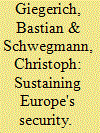

|
|
|
|
|
| Publication |
2014.
|
| Summary/Abstract |
The austerity efforts of European governments following the sovereign debt crisis have reinforced the long-running trend of shrinking defence expenditure in Europe. The need to implement a sustainable spending and budget policy in order to prevent young and future generations from being unduly burdened with debt is often used as the key justification. This argument makes obvious sense. But it isolates financial considerations and budget consolidation from a world in which the uncertainty of developments in the international security realm remains a core feature of international politics. The result is that the goals of financial policy and security policy are increasingly in conflict. Security policy, too, has to be sustainable for the state to discharge its responsibility for the security and freedom of its citizens in the future.
|
|
|
|
|
|
|
|
|
|
|
|
|
|
|
|
| 10 |
ID:
075399


|
|
|
|
|
| Publication |
2006.
|
| Summary/Abstract |
The article surveys the responses to the European Security and Defence Policy (ESDP) of two important external actors: the United States and Russia. It explains the motivations behind these responses and the effect of the latter on the development of the ESDP. The survey finds that both the Clinton and the Bush administrations in the USA have expressed cautious support for the initiative while insisting on NATO's salience in Europe. Russia's enthusiasm for the project is an effort to ensure its participation in European and global security affairs. The conclusion of the article briefly explores the implications of the empirical observations in the light of the future development of the ESDP.
|
|
|
|
|
|
|
|
|
|
|
|
|
|
|
|
| 11 |
ID:
070966
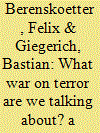

|
|
|
|
|
| Publication |
2006.
|
| Summary/Abstract |
This article critically assesses Alistair Shepherd's conclusion that ESDP is of limited utility in the post-9/11 world. We argue that this view is flawed for three reasons: first, Shepherd's analysis rests on an American-centric interpretation of the 'war on terror', neglecting the fact that the European perspective of the current security environment, and how to deal with it, is quite different from the American one. Second, we contend that Shepherd neglects ESDP's development as a tool for both military and civilian crisis management, which leads him to, third, underestimate a variety of activities of the EU and member states aimed at addressing threats of terrorism and WMD proliferation. Building on this criticism, it is suggested that the issue of ESDP's 'relevance' should not, indeed cannot be measured by assessing its usefulness for an American-defined war on terror. Rather than asking what the EU can do for the US, we propose that the more substantial question is how the EU is equipped to address the threats of terrorism and WMD proliferation as they appear to Europeans.
|
|
|
|
|
|
|
|
|
|
|
|
|
|
|
|
| 12 |
ID:
192140
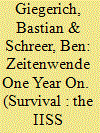

|
|
|
|
|
| Summary/Abstract |
In response to Russia’s invasion of Ukraine on 24 February 2022, German Chancellor Olaf Scholz announced a Zeitenwende, or historical turning point, for German foreign and defence policy. Expectations of profound German geopolitical, geostrategic and geo-economic transformation were raised both in Germany and among Berlin’s allies. One year later, Germany’s greatest success has come in the geo-economic arena, where progress has been made to reduce Germany’s energy imports from Russia. Geopolitically, the picture is less convincing. While Scholz has committed to the defence of NATO territory against potential Russian aggression, it is not obvious whether the German government really perceives Russia as a direct threat to the country. Berlin has yet to formulate a convincing geopolitical leadership role in Europe, and it remains to be seen if the new defence minister, Boris Pistorius, will succeed in giving shape to much-needed Bundeswehr reform and resolve major readiness and procurement challenges. Consistent pressure from NATO allies will be needed to help bring about major change to Germany’s strategic and defence policy.
|
|
|
|
|
|
|
|
|
|
|
|
|
|
|
|
|
|
|
|
|